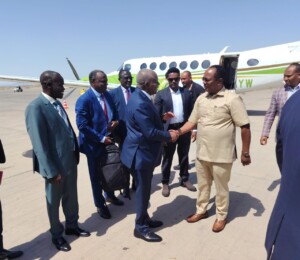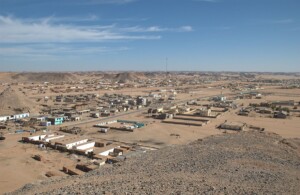Protests, vigils in Sudan calling for justice
On Tuesday, protests and vigils were held in Khartoum and a number of other cities and towns in the country for a myriad of reasons. The Forces for Freedom and Change (FFC) called for solidarity marches after a boy was killed in Omdurman.
 Demonstration in support of the Declaration of Freedom and Change, El Fitihab in Omdurman, July 25, 2019 (RD)
Demonstration in support of the Declaration of Freedom and Change, El Fitihab in Omdurman, July 25, 2019 (RD)
On Tuesday, protests and vigils were held in Khartoum and a number of other cities and towns in the country for a myriad of reasons. The Forces for Freedom and Change (FFC) called for solidarity marches after a boy was killed in Omdurman.
FFC neighbourhood committees in El Fitihab and El Muhandisin in Omdurman reported in a statement the death of Mohamed Saadeldin (16) inside his home in El Fitihab Square 2 on Monday.
The boy was fatally hit by a stray bullet when security forces attempted to disperse people celebrating the Constitutional Declaration agreed on by the ruling Transitional Military Council (TMC) and the FFC on Saturday.
“The incident is a miserable attempt to spread insecurity among the people and destabilise the situation following the agreement,” the statement reads.
The committees appealed to “all Sudanese to launch rallies in memory of Mohamed Saadeldin”.
Activists in Dongola in Northern State staged a vigil outside the house of Yasir Yasin who was shot dead on Sunday evening when regular forces shot at people demonstrating against continuing power outages in the town.
In El Obeid, capital of North Kordofan, activists staged a protest in front of the Diagnosis Hospital in solidarity with four demonstrators shot dead near the Libya Market in Omdurman on Thursday evening.

Pollution
People living in the oil-producing areas in West Kordofan staged a protest vigil in front of the Ministry of Oil in Khartoum, against the environmental, health, and social effects of oil extraction in the region.
The protesters handed a memorandum to West Kordofan state Councillor Mohamed Jibril, stating that the people living in oil-rich areas have not benefited from the oil, not in the fields of development nor employment.
“On the contrary, people are affected by the deterioration of the environment and die from diseases such as cancer,” a West Kordofani activist told Radio Dabanga.
After receiving the memorandum, the state councillor confirmed that “The environmental effects of oil extraction have caused the deterioration of human and animal health conditions”.
Huweida Abdelrahman, director of Mizin Organisation working in West Kordofan, said foetal mutilations and miscarriages increased in the state after oil companies began operating in the area.
For years, residents, activists and MPs in West Kordofan are complaining about industrial chemicals and petroleum residues that are causing diseases in particular among children and pregnant women in the state.

Measures
On Monday, doctors working at El Geneina Teaching Hospital in West Darfur, downed their tools in protest against the appointment of a new director-general of the state Ministry of Health. The protestors consider him a symbol of the former regime.
In a letter to the director of the hospital, the medics stated that they will continue the strike until their demands for the dismissal of the director-general and a better coordination of their work are fulfilled.
In Khartoum, staff members of the Electricity Distribution Company went on a partial strike on Tuesday. They threaten with a full strike, if their demands to dismiss the company’s new general manager and re-appoint the former manager are not met.

Personnel of the Savings and Social Development Bank in Khartoum organised a vigil in protest against the arbitrary relocation of colleagues who participated in civil disobedience actions earlier this year.
They demanded the dismissal of the bank's general manager, who is responsible for the relocation.
Parents of university students staged a protest in front of the Ministry of Higher Education and Scientific Research in Khartoum, demanding the administration to cancel the practice of admitting students who failed for their secondary school exams, and are paying to be admitted at government universities.
Rain water
Residents of Kalakla in southern Khartoum staged a vigil in front of the Jebel Awlia locality office, demanding rain water to be removed from the streets in the densely populated district.
Khartoum‘s rain water drainage system consists of ditches that are usually not maintained. Often residents collect funds among themselves to clean the ditches in preparation of the annual rainy season.
Pasture
In Kassala, herders carried out a vigil in front of the state Ministry of Agriculture and Forestry to demand a halt to farmers’ encroachment on pasture lands and the poisoning of livestock.
Electricity
Dozens of people gathered in front of the electricity office in eastern Port Sudan on Tuesday, in protest against repeated power outages for a week.
“The lack of electricity exacerbated the suffering of the people in the city as temperatures are rising again,” journalist Osman Hashim told Radio Dabanga. He pointed to the impact on “hospitals, laboratories, and other vital facilities”.
On Monday and Tuesday, the FFC neighbourhood committees in Port Sudan organised mass rallies “to renounce tribalism and promote peaceful coexistence” in the city.
“Promotion of peaceful coexistence is one of the priorities of the revolution,” a spokesman for the committees explained.
Our editorial independence means that we can continue to provide factual updates about political developments to Sudanese and international actors, educate people about how to avoid outbreaks of infectious diseases, and provide a window to the world for those in all corners of Sudan. Support Radio Dabanga for as little as €2.50, the equivalent of a cup of coffee.












 and then
and then